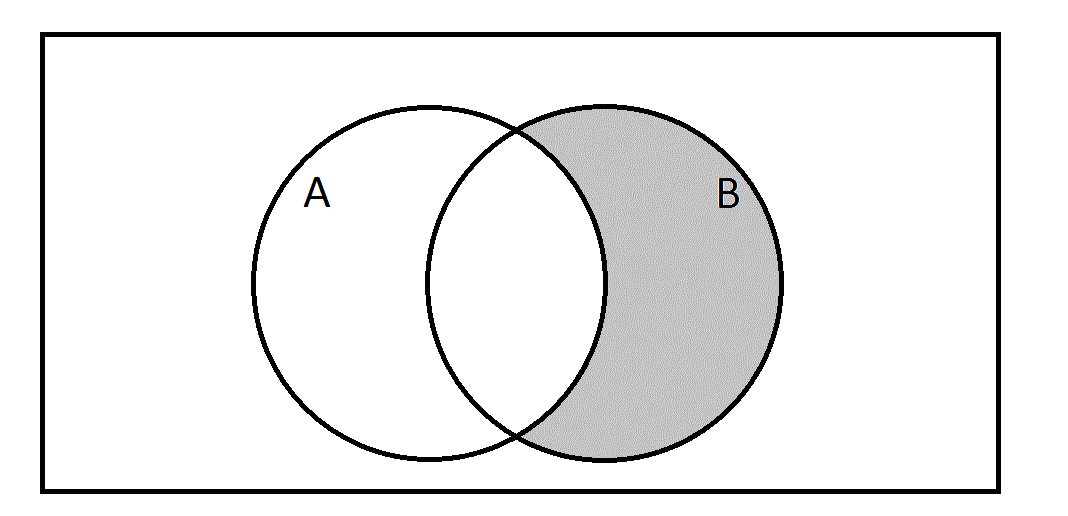All SSAT Middle Level Math Resources
Example Questions
Example Question #1 : How To Use A Venn Diagram

See the above Venn diagram. Which of the following sets is represented by the gray region?
The shaded area represents the set of all elements that are both in 




Example Question #641 : Ssat Middle Level Quantitative (Math)

See the above Venn diagram. Which of the following sets is represented by the gray region?
The gray region represents all elements that either are in 





Example Question #1 : Data Analysis
Given the Venn diagram below, which of the following does not belong to 

The symbol 

Example Question #212 : Data Analysis

Let set 






Which of the following numbers would appear in the gray region of the Venn diagram?
The gray area represents the portion of 




Therefore, 4,572, 3,438, and 8,544 can be eliminated.



Example Question #3 : How To Use A Venn Diagram

The above Venn diagram represents survey respondents from a recent political poll. Based on the respondent's political affiliation, they were classified into group 

What percentage of the respondents were classified into both groups?
The common portion of this Venn diagram represents the percentage of respondents that were classified into both groups. In order to calculate the percentage that represents the amount of respondents classified into both groups, first find the sum of group 


The solution is: 
Example Question #221 : Data Analysis

Mr. Robinson surveyed his class to find out what his students planned on doing during their summer vacation. Every student in his class stated that they planned on swimming with their friends and/or travel with their family.
What percentage of Mr. Robinson’s class planned on both swimming with their friends and traveling with their family?
The common portion of this Venn diagram represents the percentage of Mr. Robinson's students that stated they planned on both swimming and traveling during the summer. In order to calculate the percentage that represents the amount of students classified into both groups, first find the sum of the swimming group and traveling group. Then subtract that sum from 
The solution is:
Example Question #5 : How To Use A Venn Diagram

Kelly and Antonio are in a group together on a popular social media website. They realized that within the group they have mutual friendships as well as friendships exclusive of one another.
What ratio accurately represents the amount of friendships within the group that they have in common to those that they do not have in common?
In order to find the ratio of friends that Kelly and Antonio have in common compared to the group members who are only friends with one or the other first find the percentage value of the common portion of the Venn diagram. To calculate this value, find the sum of the two exclusive groups and then subtract that sum from 
This means that 


This means that 

Example Question #6 : How To Use A Venn Diagram

Kelly and Antonio are in a group together on a popular social media website. They realized that within the group they have mutual friendships as well as friendships exclusive of one another.
What ratio accurately represents the amount of friendships within the group that they do not have in common to those that they do have in common.
To find the ratio of Kelly and Antonio's exclusive friendships to their mutual friendships--find the sum of the two exclusive groups in the Venn diagram:
This means that 


This means that 

Example Question #221 : Data Analysis

Results from a recent political poll are represented by the Venn diagram above. The results indicate the percentage of voters who have only voted for Democratic presidential candidates, only Republican presidential candidates, and those that have voted for both Democratic and Republican candidates in the past.
What percentage of respondents have voted for both Democratic and Republican presidential candidates?
Not enough information is provided.
To solve this problem first find the sum of the two exclusive groups shown in the Venn diagram:
This means that 
To find the value of the common portion of the Venn diagram, calculate the difference between 

This means that 
Example Question #8 : How To Use A Venn Diagram

The above Venn diagram represents survey respondents from a recent political poll. Based on the respondent's political affiliation, they were classified into group 

What fraction of respondents were classified into only group 
Since the information provided in the Venn diagram represents percentages, convert the quantity in category 

The solution is:
Group
Thus:
Certified Tutor
All SSAT Middle Level Math Resources

































































